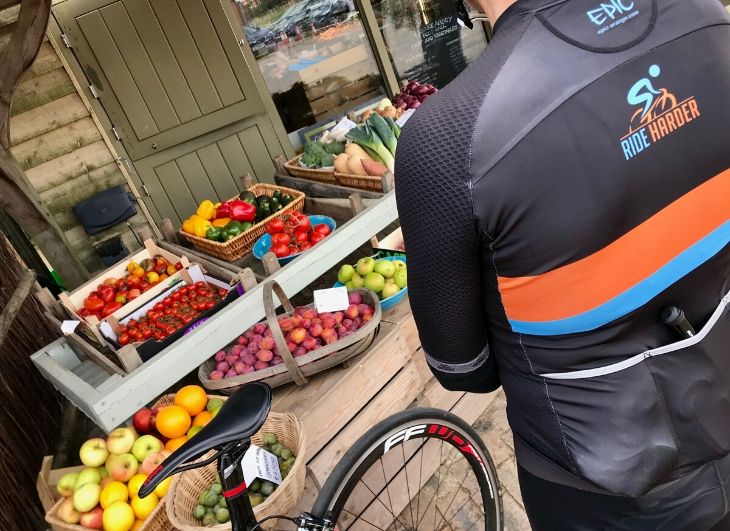If you are into your cycling then you will appreciate how important fuel is whilst riding but I regularly get asked what should I eat and how much? It is vital to plan your nutrition for any ride over an hour to prevent the dreaded “bonk” which is basically when you’ve hit empty. A big mistake of mine when I started cycling would be that I would eat on every ride regardless of the duration. This did nothing to help my weight loss and I’m sure there were a few rides where I actually ate more calories than I burned!
Your body has about enough energy for one hours exercise so you only really need to eat if you are doing longer than this but it is important that you don’t wait until you feel hungry as this will be too late so make sure you fuel yourself regularly throughout the ride. Try and eat regularly throughout the whole ride, around every 20-30mins.
A good starting point is to make sure you’re fully hydrated so not hungover from the night before as you will be playing catch up for the entire ride. A great breakfast choice is porridge as this will fill you up and is made up of low GI carbs which is slow releasing so will fuel your muscles for the start of the ride.
How much do I need?
This varies from person to person so it’s important to know your own individual requirements. As a very general rule, you need just under 1g of carbs per kg of weight so work out what that would mean for yourself and test it out on your next ride, then adjust it accordingly until you are happy with the right amount. For example, someone weighing 75kg would need around 70g of carbs every hour that you are riding. This can be a combination of energy gels, whole foods and sweets.
It is also important to know what is in your food so you can plan your nutrition. Not all nutritional brands have the same amount of carbs so check what you currently use for its nutritional value. There are also some great natural/normal food options that work just as well like bananas.
Some food examples along with the carb content.
Banana – 26g
Jelly Babies (per 3) – 14g
Fig roll – 12g
I am a fan of trying to eat as much natural whole foods as possible. A good balance of food sources would include dates or crystalized ginger for super fast energy release along with rice cakes or an oat energy bar which would be more slow release. Above all it’s important to find something that you enjoy and will want to eat otherwise it will be no good left in your jersey until you get home.
Why not make your own energy bars, they taste great and save you money too!!!
Another important factor that is often overlooked is hydration. It is recommended that you consume around 500-750ml of fluid per hour on the bike depending on the weather conditions. A great supplement to add to your water is electrolyte tabs which are vital to replacing essential minerals that are lost during sweat, one of which is sodium that can cause cramp.
The final part that is often overlooked is recovery after your ride, it is vital that you re-fuel after a long ride within 30mins of finishing as this is the optimal refuelling period to repair and refuel your muscles. Eating a carbohydrate-rich meal or drink along with some protein will help your muscles recover quicker allowing you to be able to train again sooner.
The amount you require would again be around 1g of carb per kg of body weight but with the addition of at least 20g of protein. Beans and egg on toast would be a great quick meal to knock up but if you don’t have access to a kitchen then a recovery shake is great on the move option.








